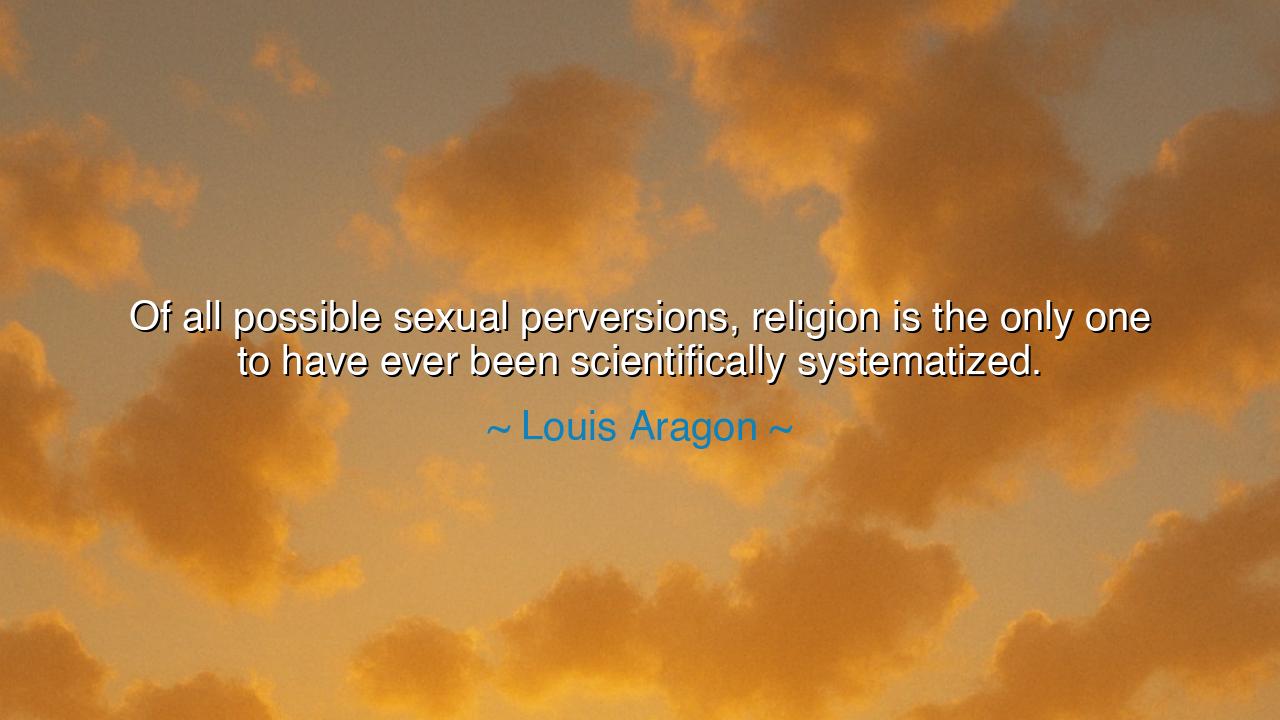
Of all possible sexual perversions, religion is the only one to
Of all possible sexual perversions, religion is the only one to have ever been scientifically systematized.






"Of all possible sexual perversions, religion is the only one to have ever been scientifically systematized." These words, uttered by Louis Aragon, strike a chord in the soul, resonating through the corridors of history, where the realms of faith and reason have eternally clashed. To understand this assertion, we must first reflect upon the nature of both sexuality and religion. Sexual perversions, often defined as deviations from the natural or normative, carry with them a burden of social and moral condemnation. Yet, religion, that divine or spiritual pursuit, holds a paradoxical place in human history—seen as a source of salvation for the soul, yet subject to human manipulation and institutionalization.
Aragon's quote challenges us to see the scientific systematization of religion as an intellectual endeavor—where faith, once seen as a purely divine or supernatural concept, became shaped, codified, and institutionalized by human hands. As science, in its quest for order, attempts to categorize and explain the world, so too has religion been subjected to this same scrutiny. Institutions of faith, much like the study of any discipline, have sought to define, classify, and control the beliefs, rituals, and practices that govern the spiritual lives of millions.
In the annals of history, we find many examples where religion has been institutionalized and systematized with remarkable precision. Take, for example, the Catholic Church in medieval Europe, where the doctrine of faith was meticulously codified in the form of the Catechism, the Canon Law, and countless theological debates. These texts were not merely expressions of divine will but became instruments of power that shaped not only the lives of individuals but the very fabric of society itself. Religion, under such conditions, was no longer a personal, intimate experience but a system that sought to categorize every aspect of human life.
Furthermore, consider the influence of scientific methodology on religious thought in the Enlightenment era. Thinkers such as Voltaire and Rousseau began to dissect the nature of religion as if it were any other phenomenon. They sought to strip away the mystical veil and examine religion through the lens of reason and rationality. In this intellectual climate, religion was no longer the sacred domain of the divine; it became a subject for scholarly critique, subject to the same scientific scrutiny as any other institution or system of belief.
But this brings us to the crux of Aragon’s insight—religion, which has for millennia provided a framework for the sacred and the moral, became over time a powerful force in shaping society's structure and individual behavior. Much like any other form of control, it was subject to the hands of power. Rituals, once divine expressions of spirituality, were codified, monitored, and regulated. The clergy became the intermediaries between the divine and the mundane, determining who could access salvation and who was condemned. This systematization bore all the marks of an institution seeking to enforce order, define the sacred, and control the spiritual lives of the people.
In the spirit of ancient wisdom, let us now consider the lesson that arises from Aragon’s words. Faith is not something to be blindly followed but understood and questioned. The systematization of religion should not blind us to its deeper, more personal meanings. It is crucial for each individual to seek a connection with the divine in their own way, and not merely follow the prescribed systems handed down by institutions. Let us learn, then, to approach religion with both a sense of respect for its historical importance and a critical eye for its contemporary relevance.
We must also be mindful of how power—whether political, social, or religious—can shape and control the ideas we hold sacred. Freedom of thought, as exemplified by those great philosophers who challenged the status quo, should be embraced. The divine is not the sole property of any one institution, and the search for meaning, purpose, and truth should remain the most personal and sacred of journeys.
Thus, the story of religion and its systematization is a tale of human aspiration and control, a dynamic of spiritual yearning intertwined with institutional power. Let us be vigilant in the pursuit of understanding, and always remember that true faith must come from within—unmediated, unbound, and free.






AAdministratorAdministrator
Welcome, honored guests. Please leave a comment, we will respond soon